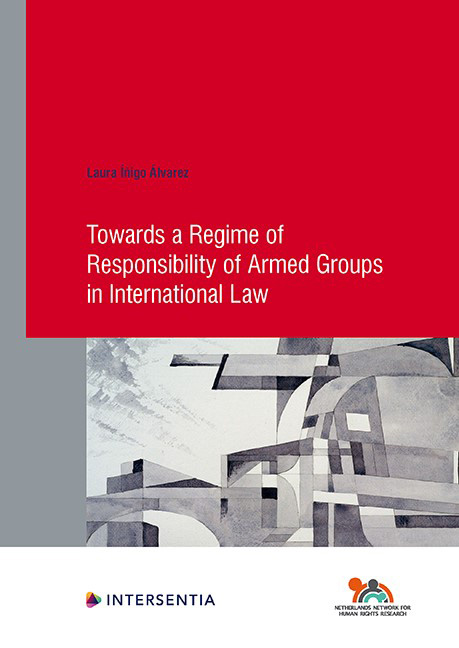Book contents
- Frontmatter
- Acknowledgements
- Contents
- Abbreviations
- Chapter I Introduction
- Chapter II The Necessity of a Responsibility Regime for Armed Groups in International Law
- Chapter III Developing a Responsibility Regime for Armed Groups in International Law
- Chapter IV Attribution of Conduct to Armed Groups
- Chapter V The Obligation to Provide Reparations by Armed Groups
- Chapter VI Conclusions
- Bibliography
- Table of Instruments
- Table of Cases
- Annex I Peace and Ceasefire Agreements
- Curriculum Vitae
- Human Rights Research Series
Chapter III - Developing a Responsibility Regime for Armed Groups in International Law
Published online by Cambridge University Press: 22 December 2020
- Frontmatter
- Acknowledgements
- Contents
- Abbreviations
- Chapter I Introduction
- Chapter II The Necessity of a Responsibility Regime for Armed Groups in International Law
- Chapter III Developing a Responsibility Regime for Armed Groups in International Law
- Chapter IV Attribution of Conduct to Armed Groups
- Chapter V The Obligation to Provide Reparations by Armed Groups
- Chapter VI Conclusions
- Bibliography
- Table of Instruments
- Table of Cases
- Annex I Peace and Ceasefire Agreements
- Curriculum Vitae
- Human Rights Research Series
Summary
INTRODUCTION
The previous chapter concluded that in order to fill the responsibility gap and to answer to the rights of victims of non-international armed conflicts a framework that addresses the responsibility of armed groups under international law is required. Following from these discussions, it is now necessary to inquire how principles of responsibility, and in particular of attribution, could be developed in relation to armed groups. In this sense, the sub-question addressed in this chapter is ‘which methodology can and should be used to develop a responsibility framework for armed groups under international law?’. In principle, there appear to be two possible alternatives: extending international criminal responsibility to collective entities, including armed groups; or using the previous framework of the Articles on State Responsibility (ASR) created by the International Law Commission (ILC) as a starting point. In this context, the International Law Association (ILA) has posed the question of whether ‘the direct responsibility of AOGs [Armed Opposition Groups] would be construed in analogy with the responsibility of states or rather with indxividual criminal responsibility’. Similarly, Bílková notes that one of the main issues of uncertainty is choosing a model between state responsibility and individual criminal responsibility or building a new type of responsibility.
Following this reasoning, some authors have suggested extending ICL to organised entities. In particular, Clapham proposes to extend ICL to armed opposition groups based on the fact that armed groups are able to violate not only IHL obligations but also those expressed in terms of international criminal law associated with crimes against humanity and genocide. This suggestion relates to the fact that criminal responsibility of collective entities is recognised in some domestic legal systems. However, as noted in the previous chapter, there are several difficulties in extending ICL in such a way, particularly in relation to the wide range of violations committed by armed groups. In fact, a combination of international criminal responsibility of individual members and international responsibility of the collectivity was preferred for the reasons already explained. On the contrary, other authors, such as Kleffner, Verhoeven and Heffes, have suggested applying the ASR to non-state armed groups by analogy due to the similarities between states and armed groups. Nevertheless, these doctrinal attempts encounter some limitations.
- Type
- Chapter
- Information
- Publisher: IntersentiaPrint publication year: 2020



